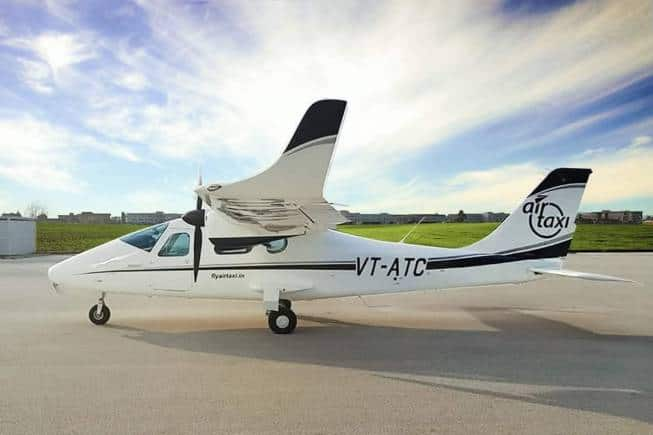Varun Suhag's Air Taxi, which has won rights to operate on 11 routes under UDAN, has a fleet of piston engine-powered aircraft
Going by most of the passionate debates by aviation geeks, the biggest fascination seem to be reserved for the bigger aircraft. But for Varun Suhag, the smaller ones have held equal intrigue.
Suhag learnt flying on three aircraft, including the Cessna 152 that seat two. He started his career as a pilot with Air Deccan on ATR 42/72, which fly anywhere between 42 to 72 passengers. When he turned entrepreneur with Flyboy Aviation in 2009, the young pilot started off with aerosports that involved powered parachutes.
Not surprising then that the pilot-turned-businessman chose the Tecnam aircraft, which includes a three-seater model, to launch services of India's newest regional airline, Air Taxi, in the next few months.
Air Taxi's parent company, Aviation Connectivity & Infrastructure Developers Pvt, has won 11 routes in the just concluded phase of UDAN 4. These were part of the 78 routes auctioned by the Ministry of Civil Aviation.
"We had won routes in the last round of UDAN too. We were in the process to start services when the lockdown happened. All the preparatory work is done to start operations soon," Suhag told Moneycontrol. He founded Air Taxi in 2014, along with Poonam Gaur who was last a pilot in IndiGo.
Air Taxi will operate from Hissar, to destinations such as Dharamshala, Chandigarh and Amritsar. Earlier it won rights to operate on Shimla-Kulu route.
But why a three-seater aircraft?

The US based National Business Aviation Association explain piston powered aircraft like this:
"Piston engines are more efficient but have a speed limitation. Piston engines are found in all automobiles, where as jet engines are limited to airliners and private jets."
Suhag explained: "Piston engines are the traditional ones. They powered all aircraft, big and small till the jet engines were introduced. Piston airplanes have one or more piston-powered engines connected to the propeller(s), which provide thrust to move the aircraft on the ground and through the air."
Small in size, these aircraft run not on aviation turbine fuel, but on aviation gas. "We source it from Indian Oil Corporation, which imports it. Some of the aircraft that seat over four, also run on petrol," Suhag added, whose another firm Citrus Air is an authorised dealer for Tecnam.
Compared to a turboprop, these aircraft are cheaper to maintain, Suhag said. Though aviation gas is more expensive than ATF, maintenance cost of the piston aircraft is still lower.
A smaller aircraft also makes business sense, said Suhag, who had also flown for Kingfisher Airlines, before turning a businessman.
One, a flight turnaround is fast and he has the flexibility of adding flights according to the demand. "We could have flights like a shuttle," the 26-year-old said. It also makes a difference in ensuring that the check-in time of these flights is as low as possible.
"I can't go beyond a nine-seater as anything more will mean that passengers will have to queue up. And that eats into time. People may rather prefer taking the road," Suhag explained. Air Taxi promises to cut the travel time between its destinations, which is about six hours by road, to 25 minutes.
At present though, the airline has received approvals to operate only one flight a day. The fare too, say the entrepreneur, may not be enough to break even. "We want to focus on introducing the product first. If there is demand, we could even look at taking the route off the UDAN scheme, thus giving the flexibility to put market-based fares," Suhag said.







